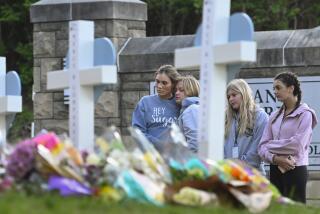U.S. troops’ deadly weekend
- Share via
BAGHDAD — Two Marines were killed Sunday in Al Anbar province west of the capital, bringing the weekend U.S. death toll to at least 27, a dramatic increase in fatalities that comes as President Bush is trying to convince a wary public of his plan to escalate the military presence in Iraq.
The U.S. military also reported that at least five more U.S. soldiers and one Marine had died in separate combat incidents in Baghdad and Al Anbar on Saturday, the third-deadliest day for American forces since the March 2003 invasion of Iraq.
Another 44 Iraqis were killed or found dead in political and sectarian violence, including the bombing of a bus in a middle-class Shiite Muslim neighborhood of Baghdad that left seven dead and 15 injured.
A British soldier was killed Sunday when his vehicle struck a roadside bomb in the southern city of Basra. Four British soldiers were injured in the blast.
The deaths come as the U.S. begins to deploy thousands of additional troops into Iraq, the first of 21,500 meant to bolster forces that must confront Shiite and Sunni Arab gunmen in a complex peacekeeping and counterinsurgency mission.
The bulk of the U.S. deaths Saturday came in the crash of a Black Hawk helicopter northeast of Baghdad. Twelve soldiers were killed.
U.S. officials have not announced the cause of the crash.
A witness and an insurgent group said that hostile fire had struck the aircraft. CNN, reporting from Washington, quoted an anonymous Pentagon official saying that the crash was probably caused by insurgent fire.
In Saturday’s most audacious guerrilla attack, gunmen in sport utility vehicles and uniforms stormed a provincial security building in Karbala as U.S. and Iraqi officials discussed plans to protect pilgrims during an upcoming Shiite religious festival. The gunmen made their way past checkpoints and burst into the building, guns blazing.
Five U.S. soldiers were killed and three injured in the attack.
Karbala is a Shiite stronghold that abuts the Sunni Arab heartland. U.S. and Iraqi officials would not disclose whether they suspected Shiite militants or Sunni insurgents in the attack.
“The mystery that accompanied this operation was so deep that we can’t accuse any side,” Aqil Khazali, the governor of Karbala province, told reporters.
The city of Karbala has fallen under the sway of radical Shiite cleric Muqtada Sadr and his Al Mahdi army. But officials loyal to Sadr’s movement, which on Sunday ended a largely symbolic boycott of the Iraqi government, denied that the Al Mahdi army had staged the assault.
“There is an extremist side that wants to pretend that this act is done by the Sadr movement, but everybody knows that the Al Mahdi army doesn’t have such abilities,” said Haidar Tarfi, a Sadr representative in Najaf.
The Sadr movement’s decision to again embrace the political process may help bolster Iraq’s weak central government, which attempts to administer the country from behind the walls of the heavily fortified Green Zone.
U.S. officials have described Sadr’s movement as the single greatest threat to the stability of Iraq and the primary instigator of sectarian violence.
White House officials, over the objections of many in Congress and a majority of Americans, have launched their plan to increase the number of troops in Iraq in hopes of stabilizing the country.
“I think that this is our chance now, our last chance, to have a new strategy which will give us a chance to prevail,” Sen. John McCain (R-Ariz.), a supporter of Bush’s plan, said in an interview on NBC’s “Meet the Press.”
The plan’s stiffest congressional opponents include some Republicans, including Sen. Chuck Hagel of Nebraska, who said in an interview on CBS’ “Face the Nation” that lawmakers should vote up or down on a resolution to stop the president’s troop increase.
“I want every member of the U.S. Senate to have to take a position on this,” Hagel said. “We have kids dying every day. It is wrong to put American troops in the middle of a sectarian civil war.”
Analysts say Bush’s plan may or may not work, but it will surely entail higher U.S. casualties, which will deepen the war’s unpopularity.
“The bind Bush is in is that most Americans have pretty much had it with this whole venture,” said Wayne White, a former State Department intelligence analyst who is now at the Middle East Institute, a Washington think tank.
“Throwing even more men into Iraq is seen as throwing good money after bad,” he said. “The strategy he’s embarking on will cause more U.S. casualties. There’s no way around it.”
Some U.S. military commanders in Iraq say the sacrifices will prove worthwhile.
“We’re winning in places that don’t make the news,” Marine Col. William Crowe, commander of the 7th Marine Regiment, said at a ceremony Saturday in which the 2nd Marine Regiment assumed responsibility for part of the Sunni-dominated Al Anbar province.
Times staff writer Tony Perry in Al Asad and special correspondents in Baghdad, Hillah, Kirkuk and Najaf contributed to this report.
More to Read
Sign up for Essential California
The most important California stories and recommendations in your inbox every morning.
You may occasionally receive promotional content from the Los Angeles Times.













